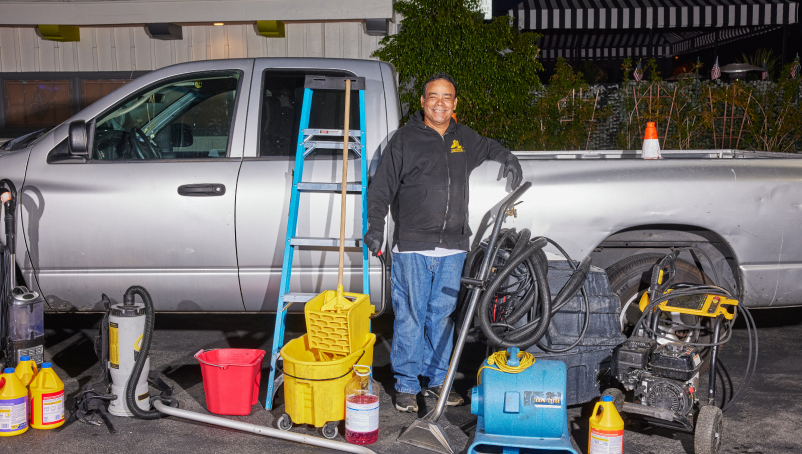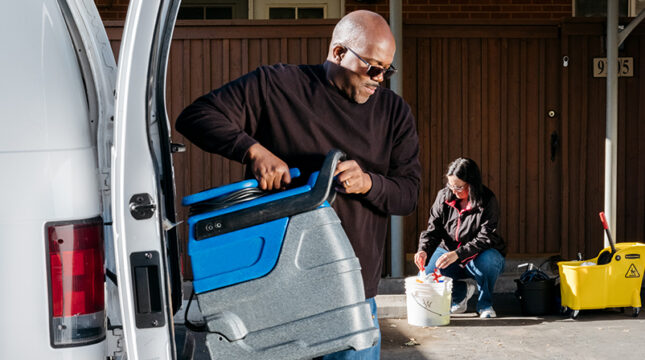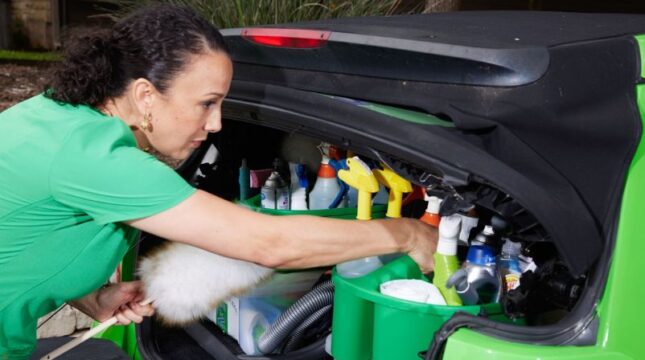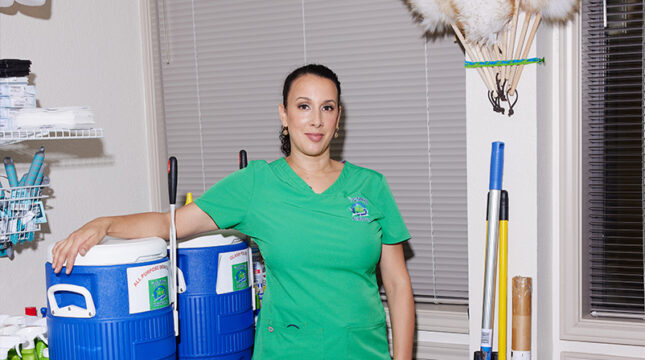5 steps to starting a cleaning business in Illinois
Before you start dusting and sweeping, these business logistics will help set you up for success in the local cleaning industry.
1. Register your business with the state
There are situations where a license for a cleaning business may not be mandatory in Illinois, such as in the case of a small sole proprietorship.
To register a cleaning business with the state:
- Decide on a business structure: Decide whether your company will operate as a sole proprietorship, corporation, LLC or any other business structure.
- Register your company name: Verify the availability of your chosen business name through the state website’s name search and post a fictitious name notice.
- Register your business: LLCs, LPs, LLPs and corporations will need to register with the Illinois Department of Revenue and pay a fee.
2. File a fictitious business statement
In Illinois, if you’re operating a cleaning business under a name that’s not your legal name, you’ll need to register an “Assumed Name” or a “doing business as” (DBA) certificate. LLCs and corporations do this through the Secretary of State Department.
Sole proprietors register with the county clerk where their business is based. Filing cost can vary by county.
3. Get an Employer Identification Number (EIN)
If your cleaning business in Illinois has employees, is a multi-member LLC, is part of a partnership or is a corporation, you’ll need an EIN for business tax purposes. This number is crucial to pay your employees and business taxes, open a bank account and apply for a loan or credit.
Getting an EIN is easy. Just head to the IRS website and follow the instructions. You’ll need to provide your business name and basic info, like your business address. And it’s free of charge.
4. Get a business license
Residential and commercial house cleaning service businesses must apply for a business license at their city and county clerk’s office.
The type of cleaning services you offer will determine the license you need. Contact the city or county clerk’s office where your business will be located for information about specific licensing requirements and procedures.
5. Register for a sales tax permit
Visit the MyTax Illinois portal to create an account and complete your registration.
You probably don’t need to register for sales tax if you operate a cleaning business that solely provides residential cleaning services.
But businesses that sell tangible personal property in addition to providing labor or services may be required to get a sales tax license.
Insurance coverage for an Illinois cleaning businesses
Having business insurance in Illinois can be mandatory and beneficial for cleaning businesses. Insurance can be a safety net if your business runs into unexpected issues such as property damage, injury or theft. Insurance coverage for your business can also make you look more professional and make you more appealing than your competition for some residential or commercial customers.
Common types of insurance coverage for cleaning businesses in Illinois include:
General Liability insurance
General liability coverage in Illinois can help protect against some of the most common business risks and accidents. This liability policy can help shield your business from losses associated with non-employees suffering bodily injury at your business (such as a slip-and-fall injury on a wet floor).
It can also be helpful if you or your employees accidentally cause property damage to someone else’s property — and you’re on the hook to repair or replace it.
Learn more about general liability for cleaning businesses.
Commercial Property insurance
Commercial property coverage can help protect the physical assets you need to do your job, such as a storefront or storage facility, plus equipment and inventory. It can help safeguard your business property against various risks, such as fire or theft.
BOP insurance (Business Owner’s Property)
A business owner’s policy, also called a BOP insurance policy, combines general liability and commercial property insurance coverage into a single, often cost-efficient and convenient package.
A BOP can carry more protection than a single policy. It can help cover damage that you or your employees may inadvertently cause to another person’s property, as well as bodily injury accidents that injure passersby on a slippery floor.
BOP keeps going to help protect your business inventory in the event of vandalism or other covered events.
Workers’ Compensation insurance
In Illinois, if your cleaning business has employees, it’s mandatory to have workers’ comp coverage.
Even if it’s not required for the cleaning industry, it can help cover work-related injuries or illnesses. This policy can help your business cover medical expenses and wage replacement for employees who get ill or suffer an injury on the job.
Learn more about workers’ comp for cleaning businesses.
Tools & Equipment insurance
If all the cleaning equipment and supplies you bought for your work — vacuums, window washers, cleaning products, etc. — were to vanish, would you have the funds to replace them all at once?
If your owned or borrowed equipment gets stolen, lost or damaged, this coverage could help you get you back to work fast and help with replacement or repairs — in your vehicle, in storage or at a job site.
Tools and equipment coverage is an add-on to general liability insurance for contractors and cleaning businesses.
While your business may need more specialized coverage, the above policies can help protect most businesses from everyday risks — especially when you’re just starting.
Different cleaning businesses may require more specialized coverage, so it’s crucial to discuss your unique needs with a licensed, experienced insurance professional.
Local Illinois city and county cleaning business license requirements
Generally, the bigger the city, the stricter the rules. And it’s your job to learn all the local guidelines before you start your cleaning business.
In addition to state mandates, local city and county governments also set rules for business licenses and permits. Always check with them to make sure your business is in compliance with local law.
Chicago cleaning service license requirements
You’ll need a general business license to run a Chicago cleaning business. You can get this license from the City of Chicago’s Business Affairs and Consumer Protection (BACP) department. If your cleaning business offers specialized services like carpet cleaning, you might need to get additional licenses or permits like a water discharge permit.
Also, if your cleaning business deals with hazardous materials or offers janitorial services to commercial buildings, follow Chicago’s specific regulations for these industries. You might need to get extra permits or certifications.
Springfield cleaning service license requirements
If you’re setting up a cleaning business in Springfield, you’ll first need to secure a general business license. You can get this through the City Clerk’s Office or the Office of Economic Development.
Keep in mind, if your cleaning business offers certain services, you might need to get additional permits or licenses.
Peoria cleaning service license requirements
Peoria businesses will need to start by securing a general business license. There might be additional permits or licenses that you need to get, depending on what you do.
And don’t forget about health and safety regulations in Peoria. It’s key that your cleaning practices are up to par with the standards set by both the Illinois Department of Public Health and any local health departments. For instance, providing mold remediation services would require a specialized license from the Illinois Department of Public Health.





